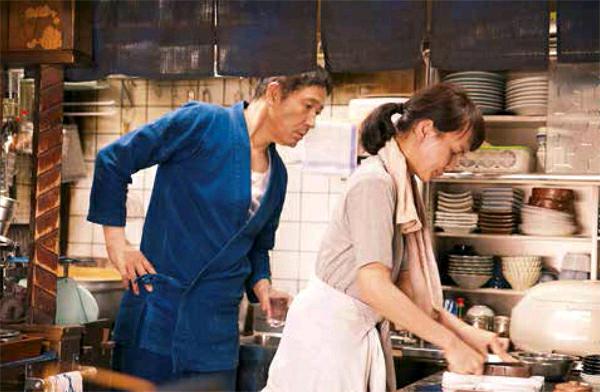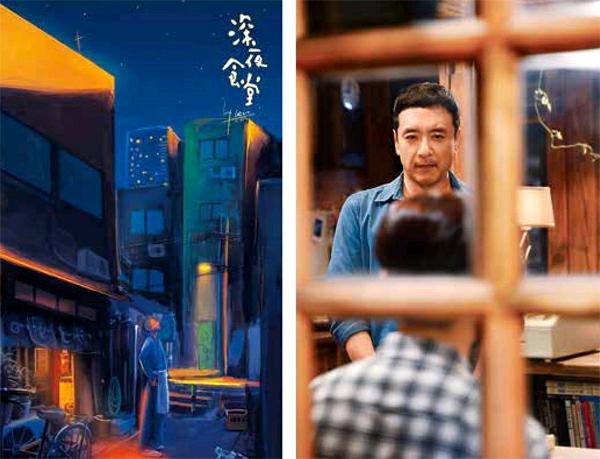《深夜食堂》中外版本之别
2017-09-14戚永晔
戚永晔
观众:有褒有贬
日本作家村上春树说:“如果有一件东西能同时安抚我们的心和胃,我想,它一定是《深夜食堂》。”
日本漫画家安倍夜郎的人气作品《深夜食堂》,讲一个小餐馆只有猪肉味噌汤套餐一种,但老板可以根据客人的要求,利用现有食材做出各种料理,并且一起带出一个个充满人情味的故事。它改编而成的同名电视剧,是亚洲年轻人追捧的最热门文化产品之一。

2015年,《深夜食堂:韩国版》上映,除了對剧情进行本土化改编之外,韩国的美食也占据了剧中一席之地。
那么,作为饮食文化泱泱大国的中国,我们的改编又会带来怎样的惊喜?最近,浙江卫视和北京卫视播映了《深夜食堂:中国版》。
日本的“深夜剧”是种特殊的电视剧形式。由于这一时间段的观众数量少,所以一般的深夜剧制作成本远低于黄金时段的剧本,多为年轻演员或小剧团演员积累经验用。然而看似“垃圾”的播放时间,因为没有黄金时段剧集的收视率压力,反而天马行空,别具趣味。日本版《深夜食堂》即是个中翘楚。
但在中国,《深夜食堂:中国版》却变成了黄金时间的热映剧。这种气质上的不同,引发了观众们的争议,有褒有贬,各有不同看法。
豆瓣网网友“猫咖”不满《深夜食堂:中国版》里的植入广告太多,“品类多到想不到,除了方便面外,还有面膜、房产中介机构、食用油、饮料,甚至还有垃圾袋”。也有网友表示,这些广告并不影响收看效果,相反,更能印证《深夜食堂:中国版》被中国观众接受的程度。
知乎网网友“杨大宝”则表示:“日本版《深夜食堂》里那种淡然的温情、欲说还休的克制,是建立在整个日本社会文化之上的,而在中国的社会,是没有这种渗透到每个人骨子里的克制的。我们喜欢人间烟火,喜欢热闹团圆,吃饭这个事情在我们的文化里,是带着直爽的温暖的呀,《深夜食堂:中国版》是一种发扬了我们独特民族个性的现象。”
仁者见仁智者见智,但“值得看看”,是很多人对《深夜食堂:中国版》的客观评价。
导演:有存有增

和日本版、韩国版一样,《深夜食堂:中国版》的故事情节,也是以在繁华都市巷弄里深夜才开始营业的食堂为舞台,将老板和形形色色的客人身后的故事与各式家常菜相融合,用暖胃的食物来营造暖心的情感,慰藉都市中孤独的人们。相比之下,中国的第三次改拍用了更多的心思。
曾执导《流星花园》《痞子英雄》等剧的台湾人蔡岳勋出任《深夜食堂:中国版》的导演。谈起参与原因,他说:自己“不仅被简单至极的故事深深打动,而且希望在现在这样的大环境里,拍摄一个暖心暖胃的治愈型电视剧”。所以,蔡岳勋联合两岸三地的演员和制作团队,重新演绎这部经典作品。
为了让《深夜食堂:中国版》更加符合中国大陆观众的口味,蔡岳勋在原著的基础上又另创了12个故事,使得《深夜食堂:中国版》既有保留,也有创新,与其他的翻拍剧有所不同。用蔡岳勋的话说,“这12个原创故事虽然延续了原著的核心价值,但与原著相比又多了一份温暖,融合了中国的文化,更加贴近中国观众的生活。”
事实上,除了食堂老板脸上有道疤痕和深夜食堂的独白“原汁原味”外,《深夜食堂:中国版》从食物到食客都明显经过了“本土化”的改编。
食物上,牛肉泡面、酱油炒面、酱油拌饭、鱼汁蒸蛋、蟹粉小笼包、东北粽、卤猪脚、回锅肉、鱼香肉丝、红烧肉……简单的食物在镜头的细腻还原下色泽鲜嫩,美味香气似要溢出屏幕,让人垂涎欲滴。厚蛋烧、猫饭等日式食物也被保留了,但却被赋予了中国本土化的色彩。
日本版《深夜食堂》中,暖心故事的主角是脱衣舞娘、酗酒的单身母亲、被父亲抛弃的著名女歌手等,这些人物的身份与深夜的黑暗相契合,他们的故事在美食的加持下体现了人性的温暖。但《深夜食堂:中国版》里出现的更多是奋斗中的学生、寂寞的都市白领、恋爱中的年轻人。在这里,轻言绝交的闺蜜,因为共同喜爱的美食,回忆起从前的友谊,重归于好;乐观的绝症患者遇到同病相连的女孩,两人相爱并相互给予力量,陪伴彼此完美地走过了最后一程;一味追求事业成功的白领,在这里结交了真正暖心的朋友,发现真情比成功更有意义。
“更阳光”“更积极”是很多人看完此片后留下的印象。
主演:有情有谊
最近几年,一些日本影视作品被翻拍,褒贬不一,但这次《深夜食堂:中国版》,却汇集两岸三地众多明星加盟客串,成为近年来最“大腕云集”的电视剧。主演黄磊,这位一直打着“文艺大叔”“艺术坚持者”等标签的资深演员,甚至还是浙江乌镇戏剧节的发起人之一,他让《深夜食堂:中国版》观众无数。
日本版《深夜食堂》是一个寂寞的电视剧,用食物串联起来的、游走在社会边缘的小人物的悲欢与孤寂,带着不动声色的温情。这种温情是克制的,会让你笑中带泪。因此在日本版《深夜食堂》中,由小林薰饰演的老板几乎是无言的状态,只有零星的“欢迎光临”“慢走”“稍等”之类招呼语,对来来往往的人和故事,他只是一个旁观者,不言不语,而所有的感情都倾注在一道道食物里。《深夜食堂:韩国版》里,老板更是寡言少语,凝神、微笑示意,就是全部。
与原著形象相比,黄磊饰演的老板多了份“人情味”,不神秘,不冰冷,稳重又温暖。这些都支撑他极具“治愈魔力”,用黄磊自己的话说,“我对这个角色有做另外一件事情的感觉,就是让他有更大的感情,但又不轻易表露,不刻意放大,只是静静的在所有人身边”。
 endprint
endprint
黃磊喜欢别人叫他“黄小厨”,翻看他的微博,除了“晒娃”就是“晒美食”,且这所有的好看好吃的都是他自己下厨做出来的。事实上,“会做饭”是担任这个角色的重要条件,会做饭的人和不会做饭的人,举手投足间是不一样的,会做的人,动作娴熟优美有真实感。所以,与其说是《深夜食堂:中国版》选择了黄磊,不如说是黄磊选择了这个角色。如今已过不惑之年的黄磊不再是风流倜傥的文艺青年,岁月褪却,聪敏于人生的他面对角色感慨:“好像一路走来,就是为了这个角色。”
《深夜食堂:中国版》汇集赵又廷、陈意涵、张钧甯、修杰楷、萧敬腾、海清、何炅、梁静、戚薇、马苏、吴昕等大咖。还有一些新面孔虽然观众不太了解,但他们却和家喻户晓的明星有着特殊关系——“拳击手”单元女主明美的扮演者于小惠,是导演蔡岳勋的妻子,而明美的儿子酷颗,就是他夫妻俩的儿子蔡丰泽。“忘年恋”单元张震的父亲张国柱展现了特有的大叔魅力,与张震一样,“圈粉”无数。在海清主演的“彼岸花开”单元,饰演海清女婿的高颜值外国小伙竟然是周华健的儿子。这些,对观众来说,都是惊喜意外的谈资。

(本文照片由作者提供)
The classic Japanese TV series “Shinya Shokudo”, or “Midnight Diner”, debuted its Chinese version on June 2, 2017, starring Huang Lei as the protagonist. The television series was first screened at Zhejiang Satellite Television and Beijing Satellite Television. The original series debuted in 2009 and tells the story of a late-night diner that opens from midnight to dawn. In 2015, it was also adapted into a South Korean TV series.
Midnight television drama is a very special program. It is not prime time and it is not prime time audience. To make such a production for midnight audience is not as expensive as primetime blockbusters. As pressure is not overwhelming, it is possible to try new ideas. The Japanese version is a midnight phenomenon.
Audiences did not like the Chinese version very much. Some websites gave low ratings for a number of reasons. The original Japanese series aimed at midnight audiences. Such a midnight production was not expensive and performers were not big stars. However, the Chinese version was designed to be a primetime series in a bid to attract younger audiences. This drastic change seems to contradict Chinese food tradition to some extent. Chinese people love to eat together happily. Eating together is usually a social activity. Some consider such a deviation a total failure. But some disagree, saying a midnight diner in China reflects Chinese characteristics. Most think it is worth taking a look at such a cultural transplantation.
Another complaint about the Chinese version is that it has too many commercials embedded in the episodes. There are commercials for brands such as instant noodle, facial, house rental, edible oil, soft drink, and even garbage bags. Some people find the product placements offensive and abominable. The wide-ranging outrage toward the product placements is a big cause of the low rating.
Directed by Taiwan-based Tsai Yueh-hsun, known for several TV series adapted from Japanese manga, such as “Meteor Garden”, the Chinese version not only adapted the original plots but also added 12 original episodes.endprint
The original series tell stories about people who stay up at night, such as a strip dancer, a single mother who drinks too much, and a famed pop singer forsaken in childhood by her father. These characters seem to chime with the midnight atmosphere. The way these stories are told in accompaniment of good food adds a special touch to humanism.
The Chinese additions keep the core value but add a better touch of warmth, a change designed to appeal to Chinese audience. “These soul-touching stories are simple. I wanted to make a television series that warms peoples heart and helps them get back on their feet,” said the director.
Dishes prepared and served at the Chinese midnight diner are largely different from those in the other two versions, though some Japanese dishes are retained. The Chinese version stars Huang Lei, a well known performing star. He loves cooking at home. His blog is full of photos featuring the dishes he cooks at home. He deemed cooking a prerequisite for illustrating this character. He reasoned that a person who could cook would look different from a person who couldnt in a kitchen. Huang Lei looks comfortable and confident there. He is cool, sympathetic, restrained, kind, warm-hearted, and equable. In comparison, the chef in the Japanese version speaks little. He is almost a silent observer. But he puts his heart and soul into the dishes he prepares. The Korean version features a chef who speaks even much less. Huang Lei is neither mysterious nor cold. He is a comfortable presence. Audiences can detect the emotions in his eyes, though he holds himself back just as his counterparts in other versions.
It also features stars from Hong Kong and Taiwan such as Mark Chao, Ivy Chen, Ning Chang, Xiu Jiekai, Jam Hsiao and many others. In a sense, the Chinese Midnight Diner looks like a hall of fame where stars and star-related people make an appearance.endprint
